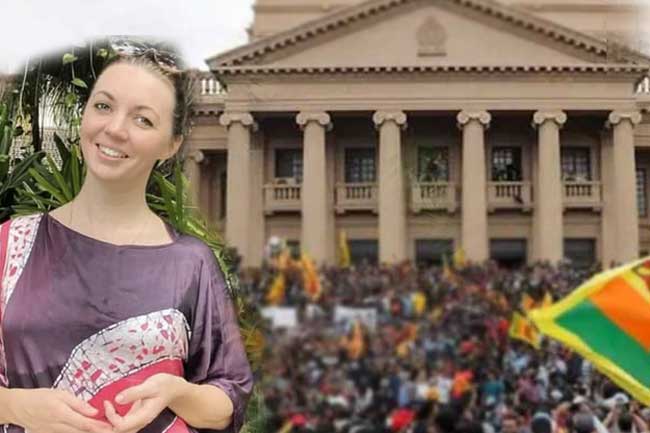A group of lawyers, academics, and civil rights activists have called for the abolition of the executive presidency, saying it has failed to deliver the aims for which it was introduced over four decades ago.
The presidency was introduced in 1978 for accelerated and sustained economic growth and development; communal harmony; and political stability, the group of professionals and 8 civil society organizations said.
“It has worsened rather than improved peace and stability, by accelerating ethnic conflict and making our political system prone to frequent crises,” the statement said.
“The executive presidential system produces these undesirable outcomes because, through its lack of accountability and responsiveness, it allows authoritarianism, corruption, and incompetence to trump the common good of Sri Lanka and Sri Lankans.
“We therefore strongly believe that this is the single most important reform that is essential for the meaningful and irreversible re-democratisation of Sri Lanka.”
They called on presidential candidates to commit to end executive presidency.
The full statement is reproduced below:
We the undersigned call upon all candidates contesting the forthcoming 2024 presidential election to firmly and publicly commit to the abolition of the executive presidential system within the first year of the next Parliament.
The experience of 46 years of the operation of the 1978 Constitution shows that the executive presidential system has not delivered on any of the aims for which it was introduced: accelerated and sustained economic growth and development; communal harmony; and political stability. Executive presidentialism has only had a negligible impact on development. It has worsened rather than improved peace and stability, by accelerating ethnic conflict and making our political system prone to frequent crises.
The executive presidential system produces these undesirable outcomes because, through its lack of accountability and responsiveness, it allows authoritarianism, corruption, and incompetence to trump the common good of Sri Lanka and Sri Lankans. We therefore strongly believe that this is the single most important reform that is essential for the meaningful and irreversible re-democratisation of Sri Lanka.
While recent experience since 2022 has only highlighted the autocratic potential of this system, we recall that in the history of presidential elections since 1988, there have been more popular mandates than not for the abolition of the executive presidency. Most recently, the people clearly made the connection between this system and the causes of bad governance and economic collapse when, during the Aragalaya of 2022, they called for ‘system change’. The only way ‘system change’ can even begin to be delivered is by abolishing the executive presidency.
List of Signatories
Individuals
1. Geoffrey Alagaratnam, President’s Counsel
2. Daniel Alphonsus
3. Dr A.M. Navaratne Bandara
4. Daneshan Casie Chetty
5. Bishop Duleep de Chickera
6. Anushaya Collure
7. Anushya Coomaraswamy
8. Dr Radhika Coomaraswamy
9. Dr Tara de Mel
10. Anoma De Silva
11. Minoli de Soysa
12. Visaka Dharmadasa
13. Fr Noel Dias
14. Rohan Edrisinha
15. Nirmaleeni Eriyagama
16. Priyanthi Fernando
17. Suresh Fernando
18. Rosanna Flamer-Caldera
19. Bhavani Fonseka
20. Dr Rajni Gamage
21. Dr Mario Gomez
22. Prof Savitri Goonesekera
23. Prof Camena Gunaratne
24. Sharmaine Gunaratne
25. Melani Gunathilaka
26. Dr Samanthi J. Gunawardana
27. Dr Ruvaiz Haniffa
28. Dr Sanjana Hattotuwa
29. Tracy Holsinger
30. Elijah Hoole
31. Rajan Hoole
32. Ameena Hussein
33. K.W. Janaranjana, Attorney-at-law
34. S.T. Jayanaga, President’s Counsel
35. Chandra Jayaratne
36. Prof T. Jayasingham
37. Tissa Jayathilaka
38. Dr Nihal Jayawickrama
39. Sarah Kabir
40. Dr Sakuntala Kadirgamar
41. Prof Gamini Keerawella
42. Dr Harshan Kumarasingham
43. Jayanthi Kuru-Utumpala
44. Danushka S. Medawatte
45. Anura Meddegoda, President’s Counsel
46. Buhary Mohamed
47. Manoj Nanayakkara, Attorney-at-law
48. Prof Arjuna Parakrama
49. Prof H.R. Pasindu
50. Dr Pradeep Peiris
51. Binendri Perera
52. Dr Jehan Perera
53. Nadishani Perera
54. Srinath Perera, Attorney-at-law
55. Dinal Phillips, President’s Counsel
56. Saliya Pieris, President’s Counsel
57. Ven. Kalupahana Piyaratana
58. Mirak Raheem
59. Dr Ramesh Ramasamy
60. Prof Ruvani Ranasinha
61. Ravi Ratnasabapathy
62. Roel Raymond
63. Dr Kanchana Ruwanpura
64. Athulasiri Kumara Samarakoon
65. Jeanne Samuel
66. Dr Paikiasothy Saravanamuttu
67. Dr Kalana Senaratne
68. Prof Tudor Silva
69. Vanie Simon
70. M.A. Sumanthiran, President’s Counsel
71. Ermiza Tegal, Attorney-at-law
72. Prof Chandragupta Thenuwara
73. Sandun Thudugala
74. Prof Deepika Udagama
75. Prof Jayadeva Uyangoda
76. Gamini Viyangoda
77. Dr Asanga Welikala
78. Dr Shamara Wettimuny
79. Dr Jayampathy Wickramaratne, President’s Counsel
80. Anoma Wijewardene
81. Dr Roshan de Silva Wijeyeratne
82. Dr Joe William
83. Godfrey Yogarajah
Organisations
1. Alliance Development
2. Association of War Affected Women
3. Centre for Policy Alternatives
4. Eastern Social Development Foundation
5. International Centre for Ethnic Studies
6. Institute of Political Economy
7. Law and Society Trust
8. Transparency International Sri Lanka


